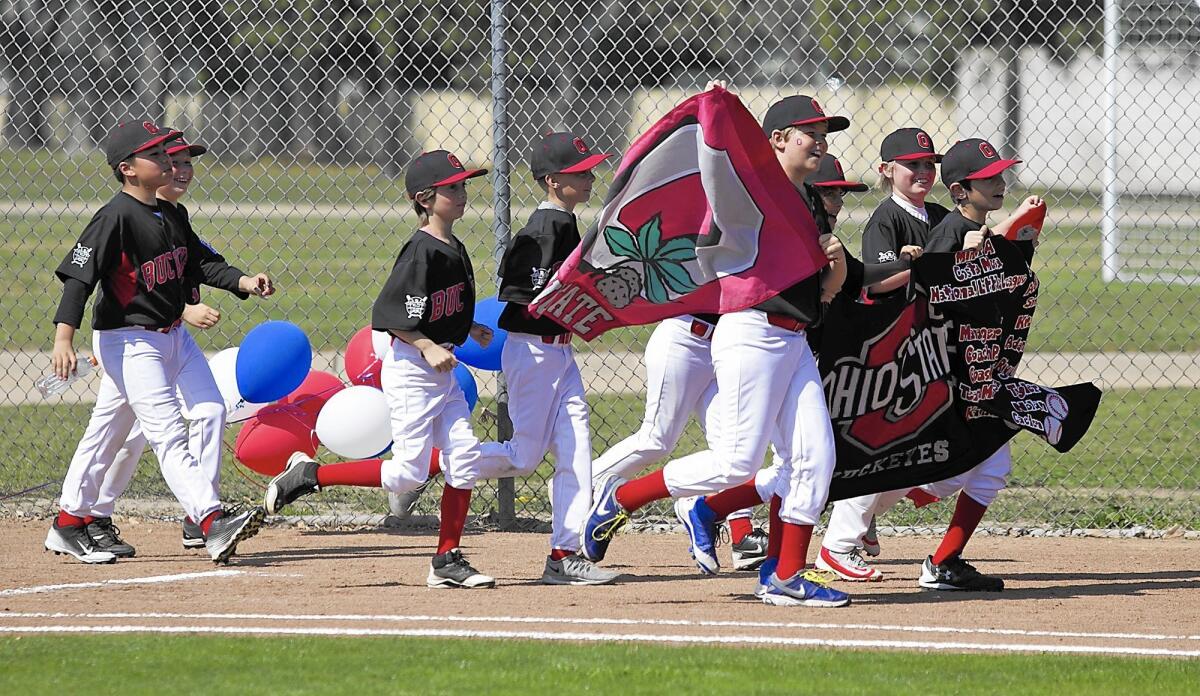Commentary: Life lessons are taught on Little League diamonds

- Share via
I read Steve Virgen’s article (“Youth in spotlight at Little League opening day, and that’s a good thing,” Feb. 28) about Costa Mesa National Little League’s opening day and am pleased you published it, letting everyone know how important it is for our youth to participate in sports, activities and family events.
Recently, my 9-year-old grandson and his team, the Florida Gators, played their first game in the Minors. Families woke up early to excited players, fed them a good breakfast, got them in uniform, packed the gear, loaded the car and headed to the fields adjacent to California Elementary and TeWinkle Middle schools in Costa Mesa.
The atmosphere was exhilarating, the camaraderie heartwarming. People were happy and communicating in person. Smartphones were everywhere, but most people kept them in their pockets, except when shooting pictures. However, and as usual, sideline siblings were texting away and not paying attention until their parents told them to watch their brother or sister.
Our family loves baseball, but I didn’t become a real fan until our grandson started playing T-ball at age 4, continuing to coach-pitch at 5, Farm from 6 to 8 and now the Minors at 9. I’ve only missed one game and have loved every minute.
I’m always the team’s photographer, so I get to know the players and coaches and have taken about 2,500 pictures so far. I’ve met scores of loving parents and grandparents who care and gladly give their time to attend games, volunteer for coaching, being the team parent and handling snack bar duty, while others build and paint fences, groom the grounds and fields, renovate dugouts and endlessly give their time to the kids and the game.
I always hear parents telling their kids to “be focused.” Well, parents should also be focused on seeing their children’s strengths and making the decisions that will benefit them now and throughout their lives. Many times, I feel parents select what they like and push their children in that direction, or let the child make the decision, instead of realizing and doing what’s truly best for the child.
Parents should be teachers and not meddlers and teach their children not just how to play but how to think and act independently of Mom and Dad. Many times parents (and grandparents) intervene too much and too soon, frustrating their children, causing many kids to rebel and quit. I’ve read that half of players leave baseball by the time they’re 14, which is such a critical age in development for adulthood.
The volunteer coaches are from all walks of life. Most have players in the game, and they give their time because they care and love their kids and baseball. It’s uplifting to stand back and watch them coach the games, teaching skills of communication and interaction and how to work through adversity. The players learn how to think on their feet and learn from their mistakes and the mistakes of others.
The coaches demand commitment from their players — to the season, the practices and a time schedule, which parents must uphold. It’s too easy to say, “I’m too tired,” “I’m too busy,” “It’s too cold (or rainy, or hot).” If parents can’t commit, or work it out, they shouldn’t sign up their kids.
Every baseball practice and game has importance and meaning for the players. It’s not just about the win or loss, it’s about life’s lessons to be taught and learned.
What attributes do we want to teach our children and grandchildren during this unprecedented time of ever-changing technology, multiple and social media, 24-hour news and Internet facts and fiction?
There are many, but let’s focus on baseball for now, as it is unique in mirroring life, allowing parents, grandparents and coaches to teach admirable virtues and skills, including setting goals, competitiveness, achievement, teamwork, character, humility, humor, confidence, passion, integrity, determination, leadership, patience, communication, respect, responsibility, loyalty, self-control, sportsmanship, time management and physical and mental strength.
Yes, winning is important, but character development is more important.
It’s essential for everyone to have self-esteem, especially children who are faced with so much so early. We must teach our children to communicate effectively with older generations, both online and in person. By creating, and participating, in safe family-oriented activities, we expose them to learning opportunities that will help form them for adulthood.
Youth baseball should be a fun and positive experience for every player. They will learn to be coachable now, at the high school level and beyond, to set goals and achieve them and not act or believe they are entitled.
In addition to family and volunteers, we need and depend on the community’s support for youth baseball (and other sports and activities), as it’s up to all of us to teach our next generation how to live and give and be involved in our ever-changing world.
LUANN JALET lives in Newport Beach.



